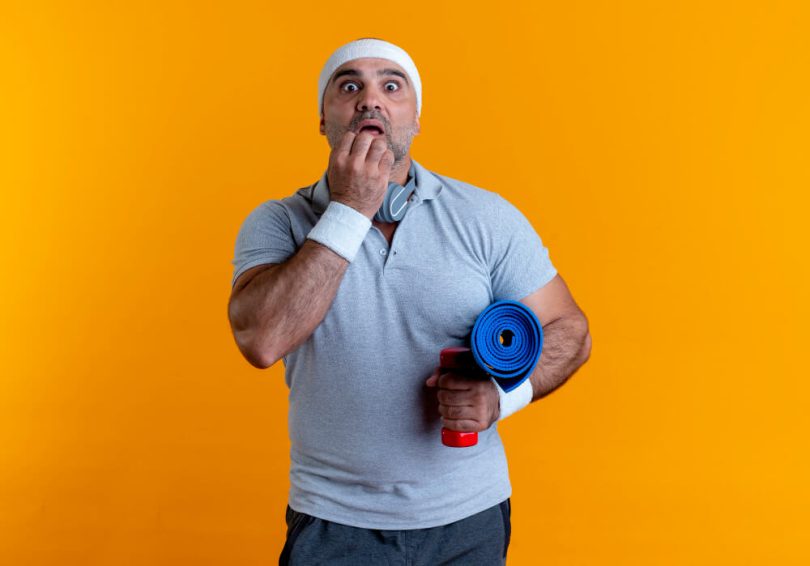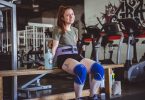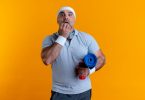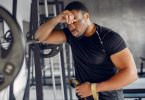Have you ever experienced the sudden urge to poop while working out? You’re not alone. Many people wonder why exercise seems to stimulate bowel movements. While it may seem strange, there are actually scientific reasons behind this phenomenon.
One rationale behind why exercising can provoke defecation is the liberation of hormones such as vasoactive intestinal peptide (VIP). This hormone stimulates intestinal motility, which can intensify bowel movements. Moreover, exercise can heighten levels of adrenaline and other neurotransmitters, which can also have an impact on bowel movements.
Another reason why exercise can lead to bowel movements is due to blood flow. During exercise, blood flow is directed away from the intestines and towards the muscles being used.
This can slow down intestinal blood flow, leading to diarrhoea or loose stools. However, it’s important to note that not everyone experiences this and it may depend on the intensity and duration of your workout.
Understanding the Body’s Response to Exercise
Role of the Digestive System
When you exercise, your body redirects blood flow away from your digestive system and towards your muscles. This can cause a decrease in digestive function, leading to discomfort or even nausea. Additionally, exercise can cause changes in hormone levels and increase stress on the body, which can also affect digestion.
Exercise-Induced Bowel Movements
It’s not uncommon to experience bowel movements during or after exercise, especially if you’re engaging in high-intensity or endurance activities. This is often referred to as “runner’s trots.”
The exact cause of exercise-induced bowel movements is not fully understood, but it’s believed to be related to the increased movement of the digestive system during exercise. Additionally, the stress of exercise can cause the release of hormones that stimulate the bowels.
If you experience exercise-induced bowel movements, it’s important to stay hydrated and avoid eating large meals before exercising. You may also want to try reducing the intensity of your workouts or taking breaks to allow your digestive system to rest.
If the problem persists or is causing significant discomfort, it’s important to speak with a healthcare provider to rule out any underlying medical conditions.
Why Does Working Out Make Me Poop
If you’re someone who experiences the urge to poop when you exercise, you’re not alone. This phenomenon is quite common and has been dubbed “the runner’s trots.” In this section, we’ll explore why working out can make you poop and what you can do to prevent it.
Impact of Physical Activity
Physical activity can have a significant impact on your digestive system. When you exercise, blood flow is directed away from your intestines and towards your muscles. This can slow down intestinal blood flow, leading to changes in bowel movements.
Additionally, exercise stimulates contractions in your intestinal muscles, which can help move stool through your digestive system. This can be especially helpful if you’re constipated, but it can also lead to an increased urge to poop.
The Runner’s Trots Phenomenon
The runner’s trots is a term used to describe the sudden urge to poop during or after exercise. This phenomenon is most commonly experienced by runners, but it can happen during any type of physical activity.
There are a few theories as to why the runner’s trots occur. One theory is that the jostling of your internal organs during exercise can stimulate the urge to poop. Another theory is that the release of certain hormones during exercise can speed up intestinal contractions, leading to an increased urge to poop.
If you’re someone who experiences the runner’s trots, there are a few things you can do to prevent it. First, make sure you’re properly hydrated before and during exercise. Dehydration can lead to constipation, which can make the runner’s trots worse.
Additionally, try to avoid eating large meals or high-fiber foods before exercise. These can be harder to digest and can increase the likelihood of bowel movements during exercise. Finally, consider timing your workouts for after a bowel movement, when your digestive system is less likely to be active.
Factors Influencing Post-Workout Bowel Movements
If you have ever experienced the urge to go to the bathroom after a workout, you’re not alone. Many people wonder why working out makes them poop. While there is no one-size-fits-all answer to this question, there are several factors that can influence post-workout bowel movements.
Type of Exercise
The type of exercise you do can have a significant impact on your digestive system. High-intensity exercises like running, jumping, or weightlifting can cause your body to release stress hormones like cortisol, which can stimulate bowel movements.
Additionally, exercises that involve a lot of bouncing or jostling, like running or jumping, can cause your intestines to move around, which can also stimulate bowel movements.
Hydration and Diet
Both hydration and diet can play a role in post-workout bowel movements. Dehydration can cause constipation, while drinking too much water can lead to diarrhea. It’s important to stay hydrated before, during, and after your workout to help regulate bowel movements.
Additionally, certain foods can also have a laxative effect, such as high-fiber fruits and vegetables. On the other hand, consuming too much protein or fat can slow down digestion and lead to constipation.
Personal Health Conditions
Individual health conditions can also influence post-workout bowel movements. For example, people with irritable bowel syndrome (IBS) may be more likely to experience diarrhea or constipation after exercise.
People with inflammatory bowel disease (IBD) may also experience changes in bowel movements due to inflammation in the digestive tract. Additionally, certain medications or supplements can have a laxative effect or cause constipation.
Managing and Preventing Exercise-Induced Bowel Movements
If you experience exercise-induced bowel movements, there are steps you can take to manage and prevent them. Here are some strategies that may help:
Proper Hydration
One of the most important factors in preventing exercise-induced bowel movements is staying hydrated. Dehydration can lead to constipation, which can make it more difficult to have a bowel movement.
On the other hand, drinking too much water during exercise can cause diarrhea. It’s important to find the right balance and drink enough water to stay hydrated without overdoing it.
Dietary Adjustments
Your diet can also play a role in exercise-induced bowel movements. Eating a large meal before exercising can increase the likelihood of bowel movements during or after your workout. It’s best to eat a light meal or snack at least an hour before exercising.
Additionally, certain foods can be more difficult to digest and may increase the risk of bowel movements. Foods high in fiber, fat, or sugar can be particularly problematic. Experiment with different foods to find what works best for you.
Exercise Timing
Timing your exercise can also help prevent exercise-induced bowel movements. If you typically have bowel movements in the morning, try exercising later in the day.
If you have bowel movements after eating, wait at least an hour after eating before exercising. Additionally, starting with a warm-up can help get your digestive system moving before you start your workout.
Conclusion
In summary, there are several reasons why you may experience the urge to poop during or after exercise. One of the most common reasons is the increase in blood flow and circulation to your digestive system, which can stimulate bowel movements. Additionally, the jostling and bouncing of your internal organs during exercise can also contribute to this sensation.
Another possible cause is dehydration, which can lead to diarrhea and other gastrointestinal issues. It’s important to stay hydrated before, during, and after your workouts to avoid this problem. Eating a balanced diet with plenty of fiber and avoiding foods that are known to cause digestive issues can also help.
If you experience frequent or severe gastrointestinal symptoms during or after exercise, it’s important to talk to your doctor. They can help you identify any underlying medical conditions that may be contributing to your symptoms and recommend appropriate treatment.







